Items
Search full-text
“Australia Council releases its first Disability Action Plan”
-
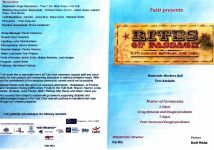 "Tutti Arts - Rites Of Passage Concert - Program" Tutti Arts 'Rites Of Passage Concert' 2012 Program - reads, in part "Tutti is Australia's first Inclusive choir and takes its name from the musical term 'Tutti' meaning everyone. From Its origins as a small singing group at Minda, the original choir has grown into a vibrant independent multi arts organisation ( Tutti Inc), deeply connected into the disability and mainstream arts worlds of South Australia and beyond. With Its strong commitment to access and inclusion, Tutti Is both a grass roots nurturer of disabled artists and a creator and presenter of high quality work which brings disabled artists, diverse communities and professional artists together for high quality performances and exhibitions.”
"Tutti Arts - Rites Of Passage Concert - Program" Tutti Arts 'Rites Of Passage Concert' 2012 Program - reads, in part "Tutti is Australia's first Inclusive choir and takes its name from the musical term 'Tutti' meaning everyone. From Its origins as a small singing group at Minda, the original choir has grown into a vibrant independent multi arts organisation ( Tutti Inc), deeply connected into the disability and mainstream arts worlds of South Australia and beyond. With Its strong commitment to access and inclusion, Tutti Is both a grass roots nurturer of disabled artists and a creator and presenter of high quality work which brings disabled artists, diverse communities and professional artists together for high quality performances and exhibitions.” -
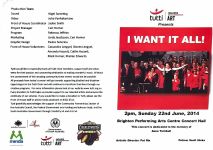 "Tutti Arts - I Want It All - Program" Tutti Arts 'I Want It All' 2014 Program - reads, in part "Tutti is Australia's first indusive choir and takes its name from the musical term. ‘'Tutti', means everyone. From its origins in 1997 as a small singing group at Minda, the choir has grown into a vibrant independent multi arts organisation, deeply connected into the disability and mainstream arts worlds of South Australia and beyond. With its strong commitment to access and inclusion, Tutti is both a grass roots nurturer of disabled artists and a creator and presenter of high quality work which brings disabled artists, and community and professional artists together for performances and exhibitions.”
"Tutti Arts - I Want It All - Program" Tutti Arts 'I Want It All' 2014 Program - reads, in part "Tutti is Australia's first indusive choir and takes its name from the musical term. ‘'Tutti', means everyone. From its origins in 1997 as a small singing group at Minda, the choir has grown into a vibrant independent multi arts organisation, deeply connected into the disability and mainstream arts worlds of South Australia and beyond. With its strong commitment to access and inclusion, Tutti is both a grass roots nurturer of disabled artists and a creator and presenter of high quality work which brings disabled artists, and community and professional artists together for performances and exhibitions.” -
 “Tutti Arts – Tutti Choir – Christmas Celebration 2014 - No More Turníng Away - Program” Tutti Arts – Tutti Choir Christmas Celebration 2014 'No More Turníng Away' Program- reads, in part "“The Tutti Choir is Australia's first inclusive choir and takes its name from the musical term Tuti', meaning everyone. From its origins in 1997 as a small singing group at Minda, the choir has grown into a vibrant independent multi arts organisation, deeply connected into the disability and mainstream arts worlds of South Australia and beyond. With its strong commitment to access and inclusion, Tutti is both a grass roots nurturer of disabled artists and a creator and presenter of high quality work which brings disabled artists, and community and professional artists together for performances and exhibitions.”
“Tutti Arts – Tutti Choir – Christmas Celebration 2014 - No More Turníng Away - Program” Tutti Arts – Tutti Choir Christmas Celebration 2014 'No More Turníng Away' Program- reads, in part "“The Tutti Choir is Australia's first inclusive choir and takes its name from the musical term Tuti', meaning everyone. From its origins in 1997 as a small singing group at Minda, the choir has grown into a vibrant independent multi arts organisation, deeply connected into the disability and mainstream arts worlds of South Australia and beyond. With its strong commitment to access and inclusion, Tutti is both a grass roots nurturer of disabled artists and a creator and presenter of high quality work which brings disabled artists, and community and professional artists together for performances and exhibitions.” - InCite Youth Arts
- Alice Springs Youth Arts Group (ASYAG)
-
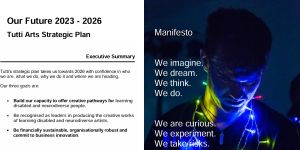 "Tutti Arts - Website - Strategic Plan 2023-2026 captured 2023" Tutti Arts Annual Reports 2023-2026, captured 2023 - reads, in part "Established in 1997, Tutti Arts is South Australia’s only multi-arts organisation where learning disabled, and neurodiverse artists create visual art, theatre, music, screen, dance and experiment with art and technology. Tutti Arts has grown, changed, rearranged, and developed over time. Tutti now works with more than 200 learning disabled and neurodiverse artists, with over 340 artist engagements every week across 3 Creative Hubs (Brighton, Port Adelaide, and the Barossa), and online. Tutti is the home for renowned disability-led collectives The Sisters of Invention, Company AT and Sit Down Shutup and Watch Film & Media Festival and has supported the career paths of many disabled artists. The Tutti Arts Centre was opened in Brighton 2020. In 2022 Tutti opened a new Regional Hub in Nuriootpa."
"Tutti Arts - Website - Strategic Plan 2023-2026 captured 2023" Tutti Arts Annual Reports 2023-2026, captured 2023 - reads, in part "Established in 1997, Tutti Arts is South Australia’s only multi-arts organisation where learning disabled, and neurodiverse artists create visual art, theatre, music, screen, dance and experiment with art and technology. Tutti Arts has grown, changed, rearranged, and developed over time. Tutti now works with more than 200 learning disabled and neurodiverse artists, with over 340 artist engagements every week across 3 Creative Hubs (Brighton, Port Adelaide, and the Barossa), and online. Tutti is the home for renowned disability-led collectives The Sisters of Invention, Company AT and Sit Down Shutup and Watch Film & Media Festival and has supported the career paths of many disabled artists. The Tutti Arts Centre was opened in Brighton 2020. In 2022 Tutti opened a new Regional Hub in Nuriootpa." - David Throsby
-
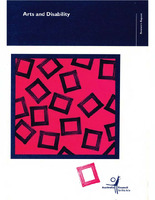 "Juliet London and Des Walsh (1995) Arts & Disability: Report Australia Council: Surry Hills." Juliet London and Des Walsh - Arts & Disability, Australia Council 1995 - Reads, in part "The Australian Bureau of Statistics estimates that 18 per cent of the Australian population has a disability. There is a basic lack of data on participation in the arts by artists with a disability. No figures were available on the number of people with disabilities applying for grants from the Australia Council or from State or Territory arts agencies. The current dearth of statistical information needs to be overcome by systematic and sustained research."
"Juliet London and Des Walsh (1995) Arts & Disability: Report Australia Council: Surry Hills." Juliet London and Des Walsh - Arts & Disability, Australia Council 1995 - Reads, in part "The Australian Bureau of Statistics estimates that 18 per cent of the Australian population has a disability. There is a basic lack of data on participation in the arts by artists with a disability. No figures were available on the number of people with disabilities applying for grants from the Australia Council or from State or Territory arts agencies. The current dearth of statistical information needs to be overcome by systematic and sustained research." -
"Maree Roche, Ben Whitburn (2019) Mate, You’re Crippin’ Us Out: Biopolitics of the Arts Curriculum in Australia and the Swinging Identities of Dis/abilities. Journal of Literary & Cultural Disability Studies.13(3). https://doi.org/10.3828/jlcds.2019.25" Reads, in part "The article explores arts curriculum in Australia as developed in the contexts of schooling, community organizations, and higher education for people with disabilities and mental health concerns. Motivated to explore whether or not students provided access to modified arts curriculum are engaging in education or receiving therapy, the aim is to address a dichotomy that is seemingly present in educational institutions, but extends well beyond the school gate and informs organizational responses to arts in the lives of people with disabilities. Resourced with the theoretical contributions of dis/ability studies for its concern for the biopolitics of disability, the authors weave personal experiences through the discussion of participation in arts throughout their lives. The article concludes with a theoretical discussion of how arts provision in the Australian context might develop the social and political value of art in the lives of people with dis/abilities and for all, on the basis that its educative value is emphasized over its therapeutic one."
-
Theatre performance ‘Take Up Thy Bed & Walk’ integrates ‘aesthetic access’” The 2012 performance ‘Take Up Thy Bed & Walk’ designed by Gaelle Mellis and produced by Vitalstatistix proved that accessibility measures could be aesthetic. As Creative Australia describes it “is credited as Australia’s first performance work incorporating ‘aesthetic access’. It embedded the performer’s physicality and communication styles – and those of potential audiences – at the centre of the creative process. The work integrated audio description, captioning, sign language and interactivity uniquely into the core of the work.” Gaelle Mellis has said of the performance that “aesthetic access can be used in ways that add layer, texture, meaning and richness to a work. Art, at its simplest, is primarily about communication. Aesthetic access, at its simplest, is a form of communication that communicates to everyone.”
-
“Documentary ‘Stepping Out’ follows first group of intellectually disabled people to perform at the Sydney Opera House” In preparation for the International Year of Disabled Persons, a documentary was made called ‘Stepping Out’ directed by Chris Noonan and narrated by Romayne Grace, a resident at the Lorna Hodgkinson Sunshine Home. The documentary follows a group of residents as they prepare for their big debut at the Sydney Opera House. The movie was shown during the International Year of the Disabled's UN closing ceremony. The 1979/1980 Australia Council report had the following statement "A production staged at the Sydney Opera House by residents of the Lorna Hodgkinson Sunshine Home for the intellectually handicapped impressed the Theatre Board as both innovative arts-based therapy and worthwhile theatre in its own right." The 1980/81 report further stated "It was the first time anywhere in the world that a group of mentally handicapped people had performed publicly in the cultural centre of their city."
-
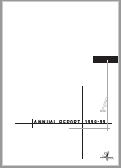 "Australia Council - Annual Report 1998-99" Australia Council Annual Report 1998-99 - discusses letter from chair of council, functions, profile, organisation chart, corporate overview, year in review, arts funding, main activities of Council and its Boards, and includes promoting the importance of accessibility in the arts for all people with and without disabilities with workshops for arts organisations and training for Australia Council staff, financial statements and lists of grants made including grants for programs, projects, information and advocacy with Restless Dance Company being the first youth dance company to receive a Triennial Grant.
"Australia Council - Annual Report 1998-99" Australia Council Annual Report 1998-99 - discusses letter from chair of council, functions, profile, organisation chart, corporate overview, year in review, arts funding, main activities of Council and its Boards, and includes promoting the importance of accessibility in the arts for all people with and without disabilities with workshops for arts organisations and training for Australia Council staff, financial statements and lists of grants made including grants for programs, projects, information and advocacy with Restless Dance Company being the first youth dance company to receive a Triennial Grant. - Braille and Audio Library
- Audio Book of the Year
- Braille and Talking Book Library
- Arts Access Australia
-
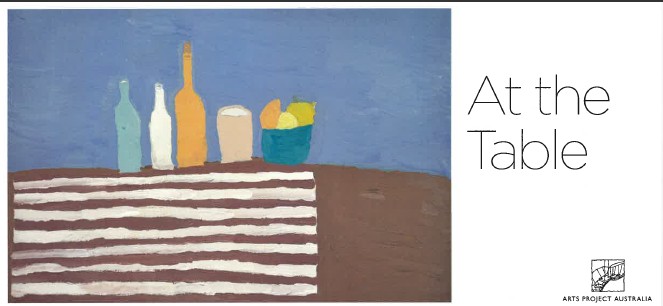 "Arts Project Australia - At The Table Exhibition 2013 -Invitation - Promotional Card" Arts Project Australia - At The Table Exhibition 2013 -Invitation - Promotional Card - reads, in part "At the Table explores the theme of food, its domestic setting, its rituals and its symbols in the work of Arts Project Australia artists. From a chicken's egg to a coffee cup to a traditional still life, the subject of food can be intimate, beautiful, quirky, abstract and many things in between. "
"Arts Project Australia - At The Table Exhibition 2013 -Invitation - Promotional Card" Arts Project Australia - At The Table Exhibition 2013 -Invitation - Promotional Card - reads, in part "At the Table explores the theme of food, its domestic setting, its rituals and its symbols in the work of Arts Project Australia artists. From a chicken's egg to a coffee cup to a traditional still life, the subject of food can be intimate, beautiful, quirky, abstract and many things in between. " - Bree Hadley
-
“Australia Council praises NSW Theatre of the Deaf and provides some funding to the Deaf theatres throughout the 1970s” The 1976/77 Australia Council annual report stated: "The NSW Theatre of the Deaf is a significant achievement. The only funded organisation in Australia working in nonverbal theatre, its production of King Lear received widespread praise. This company is now accepted as operating in a legitimate area of theatre rather than performing mime works for the deaf. This offers wide scope for innovation." The Council’s 1977/78 annual report recorded that it granted funding to the NSW Theatre of the Deaf “towards salaries of artistic director, deaf director, and tutors’ fees in 1978” for $25,000; the “presentation of theatre pieces (mime, clowning, puppetry) in public performance” for $2,500, and “towards costs of a production in 1978” for $4,000. It also awarded $1,980 to Queensland Theatre of the Deaf “towards the cost of transporting company to Sydney for seminar with NSW Theatre of the Deaf”. Drama Resource Centre (Victoria) received $2,840 “to develop student theatre at Victoria School for Deaf Children” and $630 went to Children’s Activities Time Society (Western Australia) for the “cost of deaf mime artist, Rae Gibson, to undertake four week visit to Melbourne and Sydney to work with deaf artists”. The following annual report for 1978/79 recorded that the Council granted $25,000 to the NSW Theatre of the Deaf “towards salaries of artistic director, administrator and tutors” in 1979. The Council also awarded $1,800 to the Queensland Theatre of the Deaf towards a salary for Geoffrey Rush to work with the company in 1979. The 1979/1980 Australia Council annual report mentions funding “provided for a playwright-in-residence at the NSW Theatre of the Deaf.”
-
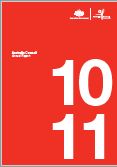 "Australia Council - Annual Report 2010-11" Australia Council Annual Report 2010-2011 – discusses year in review, letter from chairman, vision, list of council staff, message from the CEO, Strategic priorities, funding overview, statement of outcome, about the Australia Council including governance, boards, organisation, accountability, workplace; financial review and discussion of the Commonwealth Disability Strategy with a review of how the Disability Action Plan 2008–2010 addresses Australia Council roles of policy adviser, purchaser, provider and employer and how Council is committed to the National Arts and Disability Strategy adopted in October 2009 with ministers agreeing on four priority areas of action -addressing barriers, supporting practice, developing audiences and improving policy.
"Australia Council - Annual Report 2010-11" Australia Council Annual Report 2010-2011 – discusses year in review, letter from chairman, vision, list of council staff, message from the CEO, Strategic priorities, funding overview, statement of outcome, about the Australia Council including governance, boards, organisation, accountability, workplace; financial review and discussion of the Commonwealth Disability Strategy with a review of how the Disability Action Plan 2008–2010 addresses Australia Council roles of policy adviser, purchaser, provider and employer and how Council is committed to the National Arts and Disability Strategy adopted in October 2009 with ministers agreeing on four priority areas of action -addressing barriers, supporting practice, developing audiences and improving policy. -
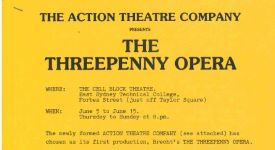 "The Action Theatre Company - The Threepenny Opera - Promotional Flyer" Promotional flyer for The Action Theatre Company production of The Threepenny Opera, chosen by Ian Watson Artistic Director of NSW Theatre of the Deaf - reads, in part "The newly formed ACTION THEATRE COMPANY (see attached) has chosen as its first production, Brecht's THE THREEPENNY OPERA. This production will combine the skills of hearing and deaf artists to produce a unique theatrical language incorporating mime, gesture and deaf sign language with music, singing and dialogue."
"The Action Theatre Company - The Threepenny Opera - Promotional Flyer" Promotional flyer for The Action Theatre Company production of The Threepenny Opera, chosen by Ian Watson Artistic Director of NSW Theatre of the Deaf - reads, in part "The newly formed ACTION THEATRE COMPANY (see attached) has chosen as its first production, Brecht's THE THREEPENNY OPERA. This production will combine the skills of hearing and deaf artists to produce a unique theatrical language incorporating mime, gesture and deaf sign language with music, singing and dialogue." -
“Australia Council grants funding for projects about disability or for disabled participants throughout the 1970s” The 1974/75 Australia Council annual report states $1,350 in funding granted to Spectrum Films (NSW) to "develop a screenplay for a feature film of the social pressures on a deaf mute”, as well as a $4,500 travel/study grant to Lloyd Nickson (QLD) "to attend summer schools in children's theatre and theatre for deaf children (USA and UK) for six months". In the same year, the Council reported Bryan Gracey as one of numerous individuals in receipt of Experimental Film funding for his short film ‘The World of a Blind Child’ (1975) about the emotional and physical difficulties 10-year-old Peter faces and how he navigates his disability. In the 1974/75 financial year, Australia Council’s crafts board awarded $1,288 to the Wheelchair and Disabled Association (NSW) for "Jewellery making tools and equipment". The 1979/1980 Australia Council annual report describes the following funding: "As in previous years, a grant was given to the Braille and Talking Book Library for its Braille Book of the Year.”
-
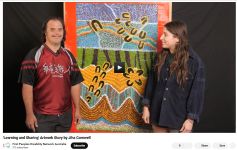 "NuunaRon Art Group - ‘Learning and Sharing’ Artwork Story by Jiha Cornwell" First Peoples Disability Network NuunaRon Art Group - ‘Learning and Sharing’ Artwork Story by Jiha Cornwell - reads, in part "The 'Culture is Inclusion' art exhibition showcases art work by the NuunaRon First Nations art group, with a lived experience of disability, telling their stories of resilience and strength through connecting to their culture"
"NuunaRon Art Group - ‘Learning and Sharing’ Artwork Story by Jiha Cornwell" First Peoples Disability Network NuunaRon Art Group - ‘Learning and Sharing’ Artwork Story by Jiha Cornwell - reads, in part "The 'Culture is Inclusion' art exhibition showcases art work by the NuunaRon First Nations art group, with a lived experience of disability, telling their stories of resilience and strength through connecting to their culture" -
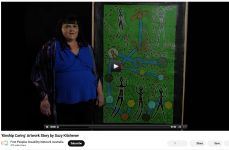 "NuunaRon Art Group - ‘Kinship Caring’ Artwork Story by Suzy Kitchener" First Peoples Disability Network NuunaRon Art Group - ‘Kinship Caring’ Artwork Story by Suzy Kitchener - reads, in part "The 'Culture is Inclusion' art exhibition showcases art work by the NuunaRon First Nations art group, with a lived experience of disability, telling their stories of resilience and strength through connecting to their culture"
"NuunaRon Art Group - ‘Kinship Caring’ Artwork Story by Suzy Kitchener" First Peoples Disability Network NuunaRon Art Group - ‘Kinship Caring’ Artwork Story by Suzy Kitchener - reads, in part "The 'Culture is Inclusion' art exhibition showcases art work by the NuunaRon First Nations art group, with a lived experience of disability, telling their stories of resilience and strength through connecting to their culture" - Virginia Hollister
